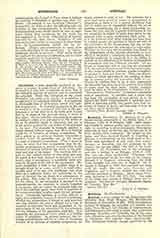

Accursius, FRANCESCO (It. Accorso), (I) a celebrated Italian jurisconsult of the Middle Ages, b. at Florence, 1182; d. at Bologna, 1260. After applying himself to various studies until he was twenty-eight, or according to other statements, thirty-seven years old, he took up the law and became one of its most distinguished exponents. He taught at Bologna, and then devoted himself to compiling a glossary or commentary on the whole body of law, which took precedence of any work then extant. Accorso, or Accursius, was not proficient in the classics, but he was called “the Idol of the Jurisconsults”. (2) FRANCESCO, son of the preceding, and also a lawyer, b. at Bologna, 1225; d. 1293. The two are often confounded. Francesco was more distinguished for his tact than for his wisdom. Edward I of England, returning from the Holy Land, brought him with him to England. He returned to Bologna in 1282, and practiced law there until his death. His two sons, Cervottus and Guglielmo, and a daughter studied law with him and also practiced in Bologna. Dante places Francesco Accursius in Hell (Inf. XV, 110). The tomb of his father and himself in Bologna bears the inscription: “Sepulchrum Accursii, glossatoris legum, et Francisci, ejus filii.”
JOHN J. A’ BECKET.

